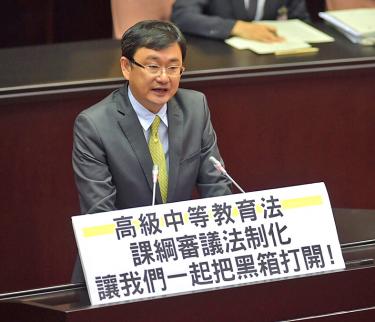The legislature yesterday passed amendments to the Senior High School Education Act (高級中等教育法) to overhaul the review process for the curriculum guidelines, which sparked protests against lack of transparency last year.
The amendments mandate that to improve accountability, the curriculum guidelines evaluation committee should be at the level of the Executive Yuan and its membership must include both governmental and nongovernmental representatives, including students’ representatives, who were not allowed a say previously.
Committee members affiliated with the government cannot exceed one-quarter of the total membership and nongovernmental committee members are to be selected through a process similar to that of the Taiwan Public Television Service Foundation’s board of directors.
The amended law authorizes education-related institutions, schools, legal personnel and groups to submit proposals for curriculum changes, in addition to permanently established governmental organizations dedicated to curriculum research and development.
Curriculum guideline research, development, evaluation and implementation must respect the guiding principles of ethnic pluralism, gender equality, transparency and political non-partisanship with regard to political parties, the amendment says.
In response to public criticism of the composition of curriculum guideline evaluation committees, the amended act is to limit government representatives in the curriculum guidelines committee to no more than one-quarter of its total of between 41 and 49 members.
Government representatives on the committee are to be nominated by the Ministry of Education from central and local government personnel and approved by the premier, the amendment says.
Nongovernmental committee members are to be nominated by the Executive Yuan and are to be accredited educational professionals, and are to include experts, academics, school principals, teachers and other education-related nongovernmental organizations, in addition to parents and students.
Nominations must be submitted to a panel appointed by the legislature for approval, the amendment says.
The panel will comprise of between 11 and 15 legislature-appointed objective and nongovernmental individuals, and is to approve the Executive Yuan’s nominee list (of the nongovernmental committee members) by a majority vote, it says.
A curriculum guideline evaluation committee member has a term of four years, with the possibility of serving consecutive terms, and each gender cannot have less representation than one-third of the committee.
Aborigines must be present in both the governmental and nongovernmental committee membership bodies, the amendment says.
To improve democracy on campus, the amendment also requires the presence of democratically elected student representatives or student association representatives on senior high school disciplinary committees.
Premier Simon Chang (張善政) responded to the amendment’s passage yesterday by saying that, while he understands that legislators want to emphasize the importance of the curriculum issue by elevating the evaluation committee to Executive Yuan level, he believes that “governmental responsibilities must be principally discharged by the relevant government agency.”
Chang said that he is concerned about the “available manpower” at the Executive Yuan and he would suggest that premier-designate Lin Chuan (林全) “reconsider” the passage of the amendment.
Source: Taipei Times - 2016/05/18









